
Research Journal of Medical Sciences
ISSN: Online 1993-6095ISSN: Print 1815-9346
Abstract
Alpha-mangostin, a xanthone derivative isolated from the pericarp of the mangosteen fruit (Garcinia mangostana), has demonstrated a range of pharmacological activities in preclinical studies. This experimental study aims to investigate the therapeutic potential of alpha-mangostin in various disease models, focusing on its antioxidant, anti-inflammatory, anticancer, antimicrobial, and neuroprotective effects. This study employed in vitro and in vivo models to evaluate the pharmacological effects of alpha-mangostin. Antioxidant activity was assessed using DPPH and ABTS radical scavenging assays. Anti-inflammatory effects were evaluated using LPS-stimulated macrophages and measuring levels of pro-inflammatory cytokines. Anticancer activity was assessed in multiple cancer cell lines using MTT and apoptosis assays. Antimicrobial effects were tested against a panel of bacterial and fungal pathogens. Neuroprotective effects were studied in a mouse model of neurodegeneration induced by oxidative stress. Data were analyzed using appropriate statistical methods to determine the significance of the findings. Alpha-mangostin exhibited significant antioxidant activity, reducing DPPH and ABTS radicals in a dose-dependent manner. In LPS-stimulated macrophages, alpha-mangostin significantly decreased the production of pro-inflammatory cytokines TNF-a, IL-1ß, and IL-6. In cancer cell lines, alpha-mangostin induced apoptosis and inhibited cell proliferation in a dose-dependent manner. Alpha-mangostin also demonstrated potent antimicrobial activity against both Gram-positive and Gram-negative bacteria, as well as fungi. In the neurodegeneration model, alpha-mangostin treatment resulted in reduced oxidative stress and improved behavioral outcomes. Alpha-mangostin shows significant potential as a therapeutic agent due to its multi-faceted pharmacological properties. Its antioxidant, anti-inflammatory, anticancer, antimicrobial, and neuroprotective effects suggest potential applications in treating a variety of diseases. Further studies, including clinical trials, are warranted to confirm these findings and explore the therapeutic use of alpha-mangostin in humans.
How to cite this article:
Sana Shahzad and Amir Alam. Alpha-Mangostin and Its Potential Therapeutic Applications: An Experimental Study.
DOI: https://doi.org/10.36478/10.36478/makrjms.2024.8.263.267
URL: https://www.makhillpublications.co/view-article/1815-9346/10.36478/makrjms.2024.8.263.267